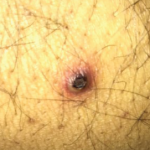NEW YORK (Reuters Health)—Newly identified biomarkers could aid in the diagnosis of inflammatory bowel disease (IBD) and help guide therapy, Canada-based researchers report.
Accurately differentiating between Crohn’s disease (CD) and ulcerative colitis (UC) is important for ensuring early and appropriate treatment. However, the conditions can’t be reliably distinguished based on clinical symptoms, site of disease, presence of granulomas, genetics or serological tests, according to Dr. Daniel Figeys and colleagues at the University of Ottawa, Ontario.
Therefore, the team sought to identify proteins that enable differentiation between the two in children with new-onset IBD, they explain in an article in Gut, online May 23.
“Using a combination of clinical, proteomics, and bioinformatics approaches, we looked at the protein changes occurring in samples collected from newly diagnosed Crohn’s disease in children—a group not complicated with other diseases, or any medications that could confound the results,” Dr. Figeys tells Reuters Health by email.
The researchers evaluated the proteomes of biopsies from 99 patients at the time of diagnosis, and prior to any therapeutic intervention. In addition to identifying the relevant proteins in a subset of the larger study, they validated their findings in a second subset.
After quantifying more than 3,500 proteins, they identified a panel of five that could distinguish patients with IBD from controls with 95.9% accuracy, and a panel of 12 capable of distinguishing CD from UC with a greater than 80% accuracy.
They also identified 116 proteins that correlated with the severity of disease, four of which—including visfatin and metallothionein-2—were components of the two panels.
“We anticipate that further studies will reveal that the biomarkers discovered in this project are a better diagnostic tool (than current technologies) in children and potentially in adults,” Dr. Figeys says.
“Moreover, we think that the proteomic results will allow for greater understanding of the conditions as a whole and help define variations in disease that are not currently readily evident,” he adds. “We also think (the results) could potentially help define treatment outcomes and provide new clues for novel mechanisms for treatment.”
Gastroenterologist and researcher Dr. Louis Cohen of Mount Sinai Hospital, New York, comments by email, “Distinguishing UC from CD was the primary aim of the manuscript. However, another strength of this study is that there are potential applications for future research to define more meaningful patient phenotypes.”
“As the authors discuss, there are some clinical and therapeutic differences associated with a diagnosis of UC or CD, though the majority of patients already receive an accurate diagnosis with current technologies and even in indeterminate cases, the clinical outcomes remain good,” he says.

